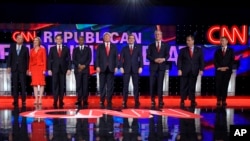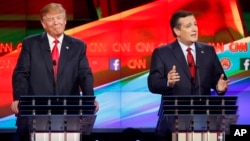The contentious race for the 2016 U.S. Republican presidential nomination heads to another debate Thursday, with seven leading contenders set to trade barbs just 18 days before voting starts.
Billionaire real estate mogul Donald Trump, a political novice, is still leading national surveys of Republican voters, but a conservative firebrand, Texas Senator Ted Cruz, has edged closer. Some polls show Cruz leading Trump in the rural state of Iowa, where party members will vote at caucuses on February 1, kicking off the months-long series of state-by-state contests leading to the party's national convention in July to pick a nominee.
After often praising each other's candidacies for weeks, Trump and Cruz have in recent days traded political attacks. They could spar directly at the debate in North Charleston, South Carolina - the sixth time the leading Republican candidates have appeared together to answer questions and challenge each other.
Cruz eligibility
Trump has questioned whether Cruz is eligible to be president, because he was born in Canada to an American mother and Cuban father. The U.S. Constitution requires that the country's presidents be "natural-born," which is often understood to mean someone who is born on U.S. soil. Others disagree that this would affect Cruz's status as a candidate, but Trump contends the senator could be disqualified if opposition Democrats take legal action to challenge his eligibility.
For his part, Cruz, who led a 16-day partial government shutdown in 2013 in a futile bid to overturn President Barack Obama's national health-care reforms, says Trump has "New York values" - code words for not embracing conservative virtues and policy positions.
Former Florida governor Jeb Bush, the son and brother of two U.S. presidents, is trailing far behind Trump and Cruz in the political surveys. He has joined the attacks on Trump, saying he is not a conservative. “For a conservative party, we need to elect a conservative. For us to fix the mess in Washington, D.C., we have to apply conservative principles."
Up against outsiders
Other Republican candidates have been attacking each other as well, hoping to emerge as an alternative to Trump or Cruz, who have campaigned as political outsiders not beholden to national Republican figures in Washington.
Florida Senator Marco Rubio, with a Cuban-American heritage like Cruz, is drawing some Republican support, although staunch conservatives voice dismay at his initial support for enacting comprehensive immigration reforms - a stance he later disavowed.
New Jersey governor Chris Christie is touting his experience as a former federal prosecutor, at a time when many Americans are worried about terrorist attacks after the Islamist-inspired attacks during the past two months in Paris and San Bernardino, California.
Former neurosurgeon Ben Carson, whose fortunes have dipped amid questions about his lack of foreign-policy expertise, and Ohio Governor John Kasich, the leader of a key voting state in the country's Midwest, are also on Thursday night's debate stage.
The Democratic party is staging its next debate Sunday. Surveys show Vermont Senator Bernie Sanders, who calls himself an independent Democratic socialist, gaining ground on the presumed frontrunner for the party's presidential nomination, former secretary of state Hillary Clinton.





